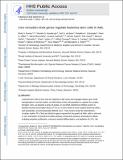Core Circadian Clock Genes Regulate Leukemia Stem Cells in AML
Author(s)
Puram, Rishi V.; Kowalczyk, Monika S.; de Boer, Carl G.; Schneider, Rebekka K.; Miller, Peter G.; McConkey, Marie; Tothova, Zuzana; Tejero, Héctor; Heckl, Dirk; Järås, Marcus; Chen, Michelle C.; Li, Hubo; Tamayo, Alfred; Cowley, Glenn S.; Rozenblatt-Rosen, Orit; Al-Shahrour, Fatima; Ebert, Benjamin L.; Regev, Aviv; ... Show more Show less
Downloadnihms769123.pdf (1.836Mb)
OPEN_ACCESS_POLICY
Open Access Policy
Creative Commons Attribution-Noncommercial-Share Alike
Terms of use
Metadata
Show full item recordAbstract
Leukemia stem cells (LSCs) have the capacity to self-renew and propagate disease upon serial transplantation in animal models, and elimination of this cell population is required for curative therapies. Here, we describe a series of pooled, in vivo RNAi screens to identify essential transcription factors (TFs) in a murine model of acute myeloid leukemia (AML) with genetically and phenotypically defined LSCs. These screens reveal the heterodimeric, circadian rhythm TFs Clock and Bmal1 as genes required for the growth of AML cells in vitro and in vivo. Disruption of canonical circadian pathway components produces anti-leukemic effects, including impaired proliferation, enhanced myeloid differentiation, and depletion of LSCs. We find that both normal and malignant hematopoietic cells harbor an intact clock with robust circadian oscillations, and genetic knockout models reveal a leukemia-specific dependence on the pathway. Our findings establish a role for the core circadian clock genes in AML.
Date issued
2016-04Department
Massachusetts Institute of Technology. Department of BiologyJournal
Cell
Publisher
Elsevier
Citation
Puram, Rishi V. et al. “Core Circadian Clock Genes Regulate Leukemia Stem Cells in AML.” Cell 165, 2 (April 2016): 303–316 © 2016 Elsevier Inc
Version: Author's final manuscript
ISSN
0092-8674
1097-4172